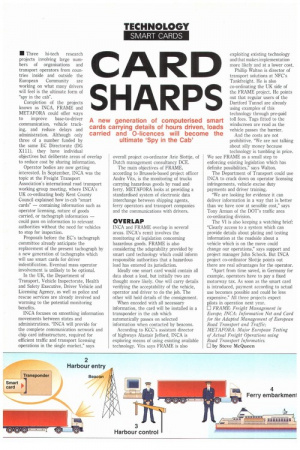SH RPS
Page 36

If you've noticed an error in this article please click here to report it so we can fix it.
El Three hi-tech research projects involving large numbers of organisations and transport operators from countries inside and outside the European Community are working on what many drivers will feel is the ultimate form of "spy in the cab".
Completion of the projects known as INCA, FRAME and METAFORA could offer ways to improve base-to-driver communication, vehicle tracking, and reduce delays and administration. Although only three of a number funded by the same EC Directorate (DG X111), they have individual objectives but deliberate areas of overlap to reduce cost by sharing information.
Operator bodies are now getting interested, In September, INCA was the topic at the Freight Transport Association's international road transport working group meeting, where INCA's UK co-ordinating body Kent County Council explained how in-cab "smart cards" — containing information such as operator licensing, nature of goods carried, or tachograph information — could pass on information to relevant authorities without the need for vehicles to stop for inspection.
Proposals before the EC's tachograph committee already anticipate the replacement of the present tachograph by a new generation of tachographs which will use smart cards for driver indentification. Eventual mass operator involvement is unlikely to be optional.
In the UK, the Department of Transport, Vehicle Inspectorate, Health and Safety Executive, Driver Vehicle and Licensing Agency, as well as police and rescue services are already involved and warming to the potential monitoring benefits.
INCA focuses on smoothing information movements between states and administrations. "INCA will provide for the complete communication network and chip card infrastructure, required for efficient traffic and transport licensing operations in the single market," says overall project co-ordinator Arie Slottje, of Dutch management consultancy DCE.
The main objectives of FRAME, according to Brussels-based project officer Andre Vits, is the monitoring of trucks carrying hazardous goods by road and ferry. METAFORA looks at providing a standardised system of electronic data interchange between shipping agents, ferry operators and transport companies and the communications with drivers.
OVERLAP
INCA and FRAME overlap in several areas. INCA's remit involves the monitoring of legislation concerning hazardous goods. FRAME is also considering the adaptability provided by smart card technology which could inform responsible authorities that a hazardous load has entered its jurisdiction.
Ideally one smart card would contain all data about a load, but initially two are thought more likely. One will carry details verifying the acceptability of the vehicle, operator and driver to do the job. The other will hold details of the consignment.
When encoded with all necessary information, the card will be installed in a transponder in the cab which automatically passes on selected information when contacted by beacons.
According to KCC's assistant director of highways Alastair Jefford, INCA is exploring means of using existing available technology. Vits says FRAME is also exploiting existing technology and that makes implementation more likely and at a lower cost.
Phillip Walton is director of transport solutions at NFC's Tankfreight, He is also co-ordinating the UK side of the FRAME project. He points out that regular users of the Dartford Tunnel are already using examples of this technology through pre-paid toll fees. Tags fitted to the windscreen are read as the vehicle passes the barrier.
And the costs are not prohibitive. "We are not talking about silly money because technology is tumbling in price. We see FRAME as a small step to enforcing existing legislation which has definite possibilities," says Walton.
The Department of Transport could use INCA to crack down on operator licensing infringements, vehicle excise duty payments and driver training.
"We are looking for evidence it can deliver information in a way that is better than we have now at sensible cost," says Tony Arman of the DOT's traffic area co-ordinating division.
The VI is also keeping a watching brief: "Clearly access to a system which can provide details about plating and testing information at the roadside about a vehicle which is on the move could change our operations," says support and project manager John Schock. But INCA project co-ordinator Slottje points out there are real advantages for the operator.
"Apart from time saved, in Germany for example, operators have to pay a fixed motorway tax. As soon as the smart card is introduced, payment according to actual use becomes possible and could be less expensive." All three projects expect pilots in operation next year.
1=1 FRAME: Freight Management in Europe; INCA: Information Net and Card for the Adapted Management of European Road Transport and Traffic; METAFORA: Major European Testing of Actual Freight Operations using Road Transport Informatics.
by Steve McQueen












































































